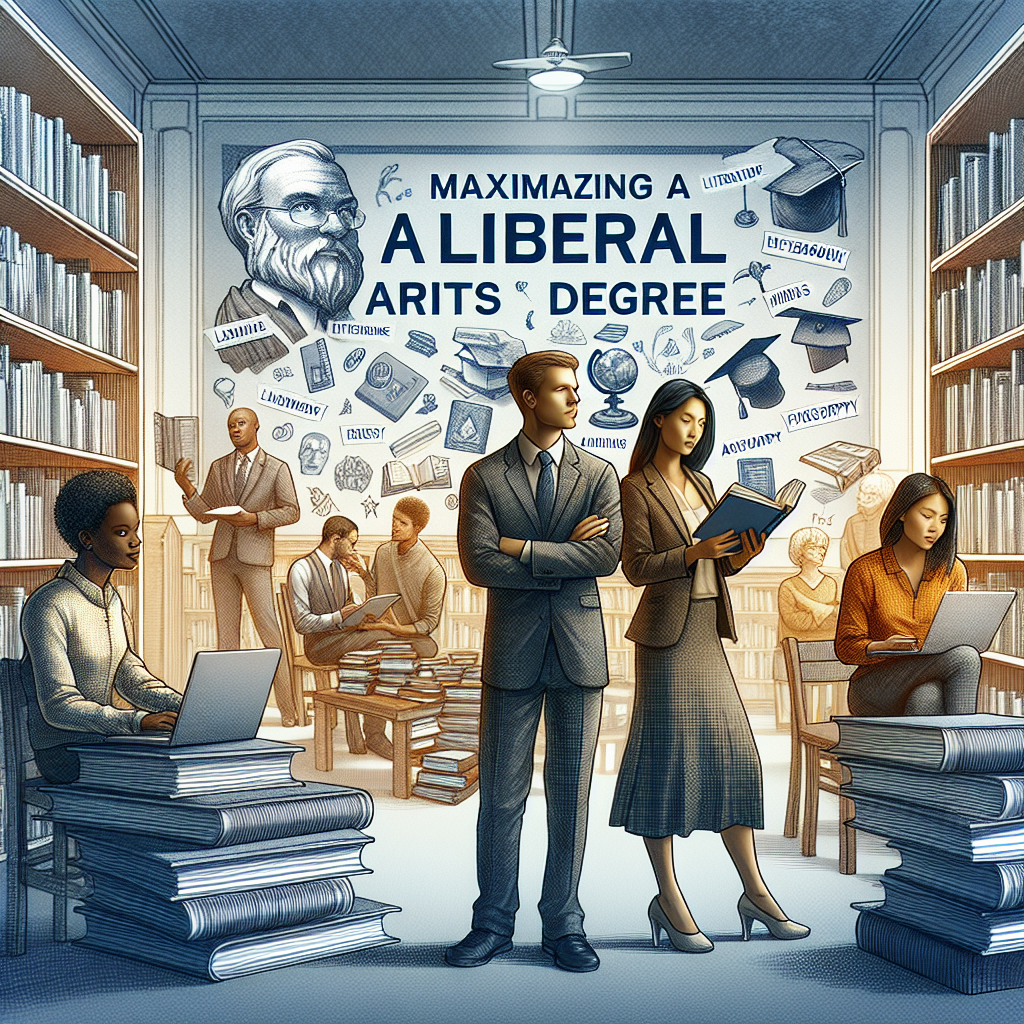A liberal arts degree emphasizes a well-rounded education that is both broad and deep. It encompasses disciplines such as humanities, social sciences, natural sciences, and mathematics, each contributing to a comprehensive educational foundation. This diversity in education cultivates critical thinking, communication, and problem-solving skills, which are universally applicable across various career fields Liberal Arts Degree Jobs. These essential skills are not just academic niceties; they are qualities that employers value highly and actively seek out in prospective employees, recognizing their importance in fostering innovation and adaptability in the workplace.
Why Liberal Arts Graduates Are in Demand
Employers appreciate the versatility of liberal arts graduates because they bring a unique set of skills to the table. These graduates often possess strong analytical abilities, effective communication skills, and a high degree of adaptability. In today’s ever-changing job market, these qualities are crucial for navigating new challenges and seizing emerging opportunities. As industries evolve and new roles are created, the ability to think critically and adapt is invaluable. The world increasingly demands professionals who can not only adapt to change but also drive it, and liberal arts graduates are well-positioned to do just that, thanks to their broad educational backgrounds and flexible skill sets.
Career Opportunities for Liberal Arts Graduates

Business and Management
Liberal Arts Degree Jobs. Liberal arts graduates often excel in business environments due to their ability to think critically and communicate effectively. These skills make them great candidates for management roles where strategic decision-making and leadership are key. They can pursue careers in human resources, project management, and sales, each of which benefits from the strong interpersonal skills and strategic thinking that a liberal arts education fosters. In addition to these roles, liberal arts graduates are also well-suited for positions in corporate communications and customer relations, where their ability to understand diverse perspectives and articulate ideas clearly can drive business success.
Education
Teaching is a natural fit for many liberal arts majors, as their broad knowledge base and critical thinking skills are directly applicable in educational settings. Whether you’re interested in working with young children or teaching at the college level, a liberal arts degree provides a solid foundation. Additionally, education roles offer the chance to specialize in various subjects, such as history, literature, or social sciences, allowing graduates to share their passion for these areas with students. Beyond traditional teaching roles, liberal arts graduates can also explore opportunities in educational policy, curriculum development, and educational technology, where their ability to innovate and adapt can enhance learning experiences.
Media and Communications
The media and communications field is another area where liberal arts graduates thrive, thanks to their strong writing and communication skills. Careers in journalism, public relations, and marketing are popular choices, requiring creativity and the ability to analyze information—skills that are hallmarks of a liberal arts education. These roles demand not only the ability to convey complex ideas clearly but also the capacity to engage and persuade diverse audiences. In addition to these traditional media roles, liberal arts graduates can also find opportunities in digital content creation, social media management, and multimedia production, where their creative flair and analytical prowess can shine.
Government and Public Service
Many liberal arts graduates find fulfilling careers in government and public service, where their skills in analysis and communication are highly valued. Positions in local, state, or federal government often require the analytical and communication skills that a liberal arts background provides. Roles in policy analysis, public administration, and community outreach are common paths, offering the chance to make a tangible impact on society. Additionally, liberal arts graduates can pursue careers in diplomacy, international relations, and non-profit advocacy, where their understanding of cultural dynamics and ethical considerations can influence policy and drive social change.
Law
While a liberal arts degree is not a direct path to becoming a lawyer, it is an excellent foundation for law school. The critical thinking and analytical skills developed during a liberal arts education are essential for legal studies, providing a strong base for understanding complex legal concepts and constructing persuasive arguments. Many successful lawyers started with a liberal arts background, leveraging their ability to think critically and communicate effectively in the courtroom. Beyond traditional legal practice, liberal arts graduates can also explore careers in legal research, compliance, and mediation, where their ability to navigate complex issues and find creative solutions is highly valued.
Emerging Fields for Liberal Arts Graduates
Technology
The tech industry might not be the first place you think of for liberal arts majors, but it’s increasingly welcoming to their diverse skill sets. Companies value the diverse perspectives and problem-solving skills that liberal arts graduates bring, recognizing their ability to approach technological challenges with creativity and innovation. Roles in user experience (UX) design, content strategy, and digital marketing are growing fields where liberal arts graduates can apply their skills in new and exciting ways. Additionally, opportunities exist in fields like data analysis and ethical AI, where the ability to synthesize information and consider broader societal impacts is crucial.
Entrepreneurship
Liberal arts graduates often possess the creativity and innovation needed for entrepreneurship Liberal Arts Degree Jobs. Their ability to see the bigger picture and connect ideas is advantageous in starting and running a business, allowing them to identify opportunities and develop strategic plans. Whether launching a startup or developing new products, liberal arts majors can succeed in entrepreneurial ventures by leveraging their broad knowledge base and adaptable skill sets. Beyond traditional entrepreneurship, they can also explore roles in social entrepreneurship and innovation consulting, where their ability to think outside the box can drive impactful change.
Nonprofit Sector
The nonprofit sector offers a variety of career paths for liberal arts graduates, where their strong communication and organizational skills are assets. Roles in fundraising, program management, and community outreach benefit from the ability to articulate a mission and engage stakeholders effectively. Working in this field often provides the opportunity to make a positive impact on society, aligning personal values with professional goals. Additionally, liberal arts graduates can pursue roles in policy advocacy, grant writing, and volunteer coordination, where their ability to connect with diverse communities and drive social change is highly valued Liberal Arts Degree Jobs.
Maximizing Your Liberal Arts Degree

Networking and Internships
Building a professional network is crucial for liberal arts graduates seeking to maximize their career potential. Networking events, internships, and informational interviews can open doors to job opportunities, providing access to industry insights and connections that might not otherwise be available. These experiences also provide valuable insights into different industries and help refine career interests, allowing graduates to better understand where their skills and passions align. By actively engaging with professionals and peers, liberal arts graduates can uncover opportunities and gain a competitive edge in the job market.
Continuing Education and Skill Development
While a liberal arts degree offers a strong foundation, continuing education can enhance your marketability and open new career pathways. Consider taking courses in specific skill areas, such as digital marketing, data analysis, or project management, to complement your liberal arts background. These additional skills can increase your job prospects and provide a competitive advantage in your chosen field. Additionally, pursuing certifications or advanced degrees can further deepen your expertise, allowing you to specialize in areas of interest and increase your value to potential employers.
Liberal Arts Degree Jobs
A liberal arts degree offers a wealth of career opportunities across various fields, providing a versatile and adaptable foundation for professional success. The key to success is leveraging the skills and knowledge gained during your education and remaining open to diverse career paths that align with your interests and strengths. By exploring different industries, building a network, and continuously developing your skills, you can find a fulfilling career that not only meets your professional goals but also provides personal satisfaction.
Remember, the versatility and adaptability of a liberal arts degree make it a valuable asset in today’s dynamic job market. With determination and curiosity, you can turn your liberal arts education into a rewarding career journey, exploring new opportunities and making meaningful contributions to your chosen field. By embracing your unique strengths and remaining open to change, you can navigate the complexities of the modern workforce and achieve lasting success.




